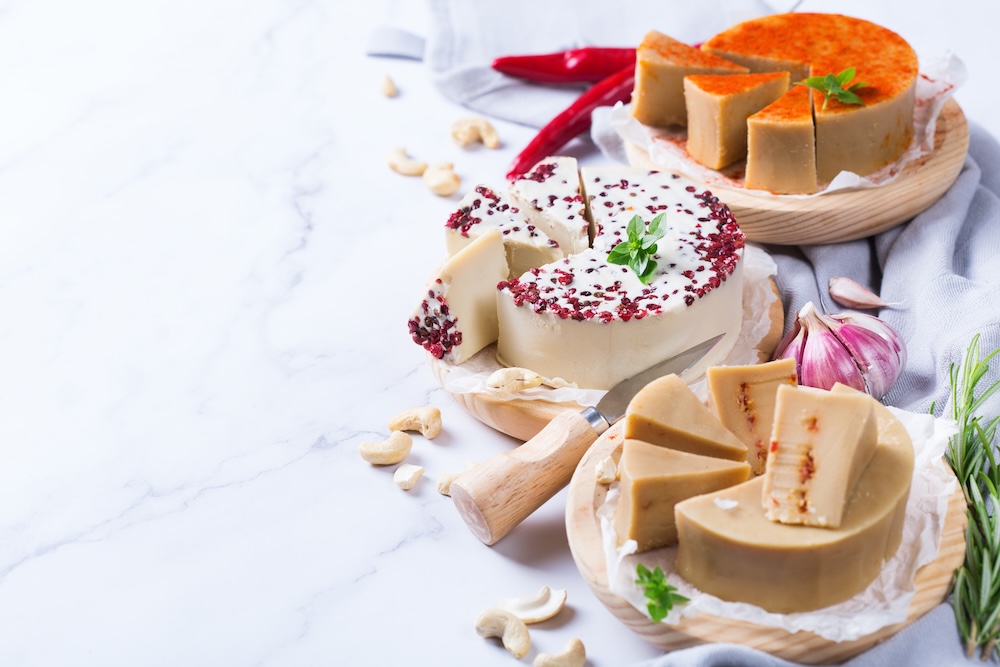For many, cheese is a comfort food with deep cultural ties. But for those following a vegan diet, living with lactose intolerance, or navigating dairy allergies, traditional cheese can be off the table. Thankfully, plant-based innovation has stepped in. Vegan cheese offers a delicious and more sustainable alternative, crafted from nuts, seeds, soy, or vegetables.
This guide explores what goes into vegan cheese, its sustainability impacts, ethical and organic brands leading the way, and other creative plant-based alternatives to dairy cheese.
Ingredients in Vegan Cheese
Vegan cheese comes in many forms, with recipes often inspired by traditional fermentation. Common bases include:
- Nuts and seeds (cashews, almonds, sunflower seeds, hemp) blended with water, salt, and sometimes probiotics or cultures for authentic tang.
- Soy (tofu or soy milk) fermented or blended to mimic creamy textures.
- Vegetables (potatoes, carrots, cauliflower) processed into smooth spreads and melts.
Brands increasingly prioritize organic, non-GMO, and fair-trade sourcing. Many rely on local farms or regional suppliers to cut transport emissions, while using ingredients grown with regenerative or low-impact agricultural methods.
💡 Tip: Always check the label. Some mass-market vegan cheeses still contain stabilizers or additives you may want to avoid.
Sustainability of Vegan Cheese
Compared with dairy cheese, plant-based cheese generally has:
- Lower carbon footprint – dairy accounts for significant methane emissions, while nut- and soy-based products have lighter impacts.
- Reduced water use – almonds and cashews do require water, but still less than dairy operations.
- Less land demand – shifting from animal feed crops to direct human consumption conserves farmland.
That said, sustainability depends on ingredient sourcing and packaging. Some cheeses still rely on plastic wraps, while others invest in compostable films, recyclable cartons, or minimal packaging. Choosing brands transparent about their supply chain and packaging can amplify your positive impact.
Ethical and Organic Vegan Cheese Brands
A growing number of producers combine great flavor with strong sustainability practices:
- Miyoko’s Creamery – pioneers cashew-based cheeses with organic, non-GMO ingredients and plant-based packaging.
- Treeline Cheese – nut-based cheeses, often raw-fermented, with eco-friendly packaging.
- Violife – coconut oil- and potato starch-based cheeses; widely available and committed to sustainability.
- Kite Hill – almond milk cheeses with recyclable packaging and non-GMO standards.
- Vtopian Artisan Cheeses – small-batch, cashew-based cheeses emphasizing local, organic sourcing.
Each of these brands blends culinary craft with environmental responsibility, showing how vegan cheese fits within a circular food economy.
Other Plant-Based Alternatives
Not every recipe needs “cheese” to shine. Many whole-food options can replace or complement it:
- Nutritional yeast – a B-vitamin-rich, nutty, cheesy sprinkle.
- Cashew cream – smooth and versatile for sauces, dips, or spreads.
- Hummus – chickpea-based spread that works on sandwiches or flatbreads.
- Tofu – crumbled, marinated, or blended for creamy fillings in lasagna or quiche.
These alternatives often require fewer resources than processed vegan cheese, making them strong allies in low-impact, plant-based living.
Incorporating Vegan Cheese Into Your Diet
Transitioning to vegan cheese is as much about experimenting as it is about substituting. Try:
- Using nut-based cheeses for charcuterie boards.
- Adding meltable vegan mozzarella on pizza.
- Swapping in tofu ricotta for pasta dishes.
- Sprinkling nutritional yeast over salads, soups, or popcorn.
Pair these with other plant-based proteins and nutrient-dense foods to ensure a balanced diet.
Final Thoughts
Vegan cheese isn’t just a substitute — it’s part of a broader movement toward sustainable, ethical food systems. By choosing brands that prioritize organic farming, fair trade sourcing, and eco-conscious packaging, you’re supporting innovation that reduces animal agriculture’s footprint and fosters healthier ecosystems.
And when you add in whole-food swaps like hummus, cashew cream, or nutritional yeast, your kitchen becomes a hub for delicious and planet-friendly experimentation.
The rise of vegan cheese shows that indulgence and sustainability don’t have to be at odds — they can melt together beautifully.









Reader Interactions